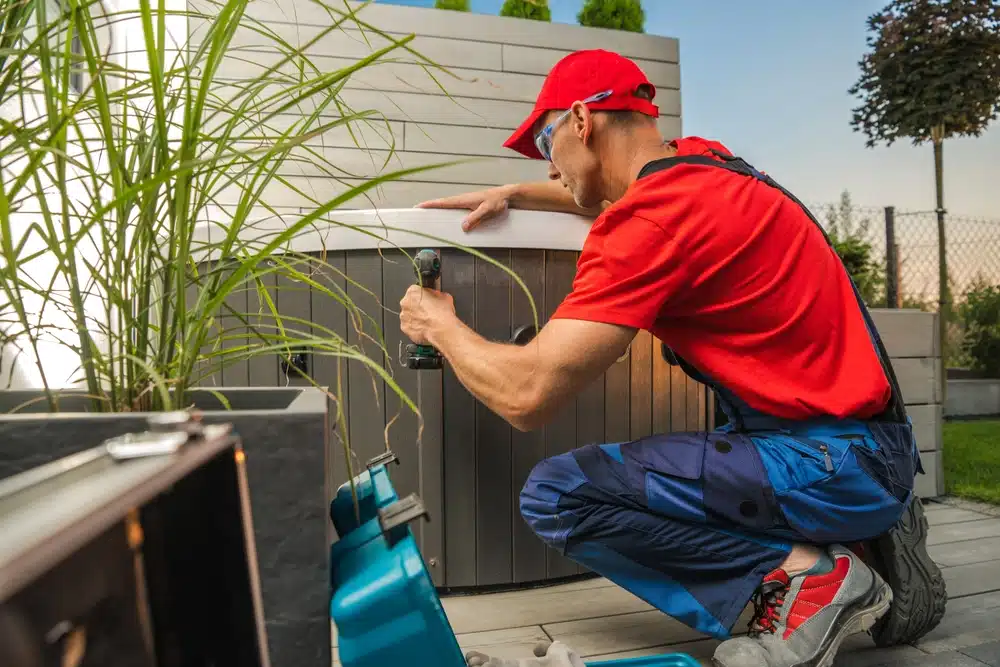 Starting a hot tub installation business can be a profitable and exciting venture for those with a passion for outdoor living and a knack for business. The first step is to research the market and identify potential customers, such as homeowners, vacation rental properties, and hotels.
Starting a hot tub installation business can be a profitable and exciting venture for those with a passion for outdoor living and a knack for business. The first step is to research the market and identify potential customers, such as homeowners, vacation rental properties, and hotels.
It’s also important to identify competitors and their pricing strategies. Next, obtain the necessary licenses and certifications, and invest in the appropriate tools and equipment to provide high-quality installations. Networking with suppliers and manufacturers can help secure favorable pricing and exclusive product offerings.
Creating a strong online presence through a website and social media can also attract customers and build a positive reputation. With hard work and dedication, a hot tub installation business can grow and thrive in the ever-expanding outdoor living market.
The current economic climate is ideal for setting up your own hot tub installation business. You may feel intimidated by starting your own business, which is why this guide will show you exactly how to do it successfully and reap the rewards.
Are you a little pressed for time today? You can find some quick answers to the most common questions in the FAQs section at the bottom of this page.
Do I need qualifications to start a hot tub installation business?
For a startup to succeed, it is imperative that it has the right qualifications. Credentials demonstrate that you have experience in the industry, which will encourage potential clients to hire you. Qualifications, in addition to providing a high-quality service and following best practices, will contribute to your reputation.
In order to set up a hot tub, you’ll need to have taken an electrician course such as:
- Level 2 Diploma in Access to Building Services Engineering (Electrical)
- Level 2 and Level 3 Diploma in Electrical Installation
- T Level in Building Services Engineering for Construction
- Installation and maintenance electrician advanced apprenticeship
What skills are important for starting a hot tub installation company?
Running your own business and working as a self-employed person will present challenges. If you’re starting a hot tub installation business, you need to have the following qualities:
- It will be necessary to have electrical knowledge when wiring the circuits for the hot tubs.
- Hot tub foundations and locations must be selected with building knowledge.
- Putting down a hot tub requires physical fitness since it’s a heavy item.
- Fitting hot tub parts correctly requires dexterity.
- To make sure installations of hot tubs are legal, you should know the rules and regulations.
- Building client relationships and providing high-quality customer service will require interpersonal skills.
- For managing your business finances and preparing quotes for customers, you need a basic understanding of maths.
What equipment do I need for hot tub installations?
Skills alone won’t guarantee the quality of your work. Cutting corners without the right equipment will lead to substandard work for clients. You can build a solid reputation among customers by investing in a high-quality inventory of tools. The following items are essential for hot tub installation:
- Level
- Tape measure
- Cleaning products
- Water testing kit
- Power drill
- PVC cutter
- Fish tape
- Wire cutter
- Pliers
- Shovels
- Screwdrivers
It will be necessary to transport all the equipment between jobs, due to the amount of equipment needed. You need a van to run your business, so owning one is also essential.
How do I start a hot tub installation company?
Setting up your business properly involves covering several areas.
Registration
Registration with HMRC and a description of your business structure are the first steps. Your financial security will be better with a limited company, and your tax burden will be reduced. Even with these advantages, sole traders are a good option, especially if they don’t need to hire staff.
It is easier to start your business with this structure because there is less paperwork involved. Although, heavy lifting and general support are usually required during hot tub installation.
Insurance
A legal fee protection plan is necessary to protect you in the event of a customer complaint or a mistake on your part. The best way to cover all bases in these cases is to have hot tub business insurance.
Here are the main types of insurance to consider:
- Public liability insurance – Provides protection against claims from customers who believe you have damaged their properties.
- Employers’ liability insurance – Employers are legally required to carry this insurance when they hire employees.
- Professional indemnity insurance – Insures you against financial losses caused by mistakes you make.
- Tools insurance – Provides coverage for replacement costs if your tools are lost or damaged because of flooding, theft or fire.
Business plan
It’s essential to prepare when starting a business, so be sure to lay out a detailed business plan. When outlining your service, keep these things in mind: your business should suit your skills and expertise, but it should also stand out from the competition. You could offer foundation laying services along with your hot tub installation service, for example, if you have construction skills.
In addition to accessory installation and regular maintenance, you can also use your hot tub experience to provide comprehensive services. These ideas can help you create a profitable niche and attract more customers by incorporating them into your business plan.
Pricing
For business opportunities to be secured, a fair pay rate will be crucial. Potential customers will look elsewhere if your prices are too high. Your business will struggle to generate profit if your pay rates are too low. The bestway to set a competitive pay rate is to study the price ranges of your competitors.
Finances
Keeping a close eye on the numbers is the best way to determine whether your business is profitable, so be sure to check the ingoings and outgoings regularly. You can use your cashflow to see how your business is performing and where you may need to make some financial adjustments by understanding your cash flow.
The upfront costs of equipment, insurance, and registration may cause you to lose money at first. To cover these costs while you get started, you may want to consider taking out a business loan.
Taxes should also be kept up with along with transactions. Your business will be subject to several taxes, so make sure you know what you should file regularly. Having trouble understanding it all, or need help documenting them, you can hire an accountant.
We have a handy guide here to help you learn more about accountancy services.
Marketing
The key to growing your client base and attracting more customers is to take steps when you start a business. It will be necessary for you to use marketing strategies that are effective in promoting your start-up. You can accomplish this by becoming a Checkatrade member.
Checkatrade’s online portfolio lets you display your customer recommendations in a way that wouldn’t be possible with word-of-mouth. By doing so, you will be enhancing your business’s reputation and promoting it to over three million users each month.
Your business should consider setting up a website that potential customers can access for information and contact information, since establishing an online presence is so important nowadays. You’ll also be able to segment your targets by creating profiles on social media as you’ll be reaching new audiences. Interacting with users and showcasing your best work will also help you drum up new business and establish relationships with clients. Keep print marketing in mind as well.
In the long run, this will save you time and money on travel by attracting local business. To raise your profile in the area, you could distribute leaflets in surrounding neighbourhoods. Choose an area where there are plenty of opportunities for you to set up and trade.
Hot tubs won’t fit in small gardens, so targeting them makes no sense. If you’re based in a densely populated city like London or Manchester, think about how you can offer products designed for urban living.
Frequently asked questions
[sc_fs_multi_faq headline-0=”h2″ question-0=”What is the profit margin on a hot tub?” answer-0=”The profit margin on a hot tub can vary depending on several factors, such as the manufacturer’s pricing, distribution channels, and marketing strategies. Generally, the profit margin for hot tubs can range from 20% to 40% or even higher for luxury models.” image-0=”” headline-1=”h2″ question-1=”Is installing hot tubs profitable?” answer-1=”Installing hot tubs can be a profitable business if done correctly and in the right market conditions. However, it depends on several factors such as the profit margin on hot tubs, the installation process, and the demand for the product in the area.” image-1=”” headline-2=”h2″ question-2=”Do I need a license to install hot tubs in the UK?” answer-2=”In the UK, there is no specific license required to install hot tubs. However, it is essential to ensure that the installation process meets all relevant health and safety regulations and building codes to ensure the safety of the users.” image-2=”” count=”3″ html=”true” css_class=””]Conclusion
Starting a hot tub installation company in the UK can be a lucrative business opportunity for entrepreneurs with experience in the industry. The first step to becoming a hot tub installation company is to research the market and identify the demand for hot tubs in the area. This can be done by analyzing the competition and conducting market research to determine the target demographic.
Once the demand has been established, the next step is to identify suppliers and manufacturers to source the hot tubs. It is essential to establish relationships with reputable suppliers to ensure the quality of the products. The installation process should be handled by qualified professionals to ensure that it is done correctly and meets all relevant health and safety regulations and building codes.
Marketing the business through various channels, such as social media, advertising, and word-of-mouth, can help to attract customers and grow the business. Overall, starting a hot tub installation company in the UK requires careful planning, research, and attention to detail, but it can be a profitable and rewarding business venture.
Jarred Musson is a versatile writer with a diverse educational background and a passion for all things business. Holding a Master of Science (MSc) degree in Marketing and a Bachelor of Arts (BA Hons) in Multimedia Journalism from Manchester Metropolitan University, Jarred possesses a unique blend of expertise that allows him to dissect and communicate complex business topics with clarity and precision.


